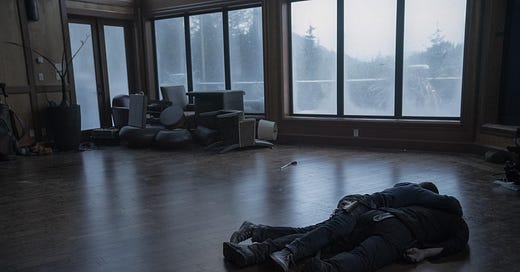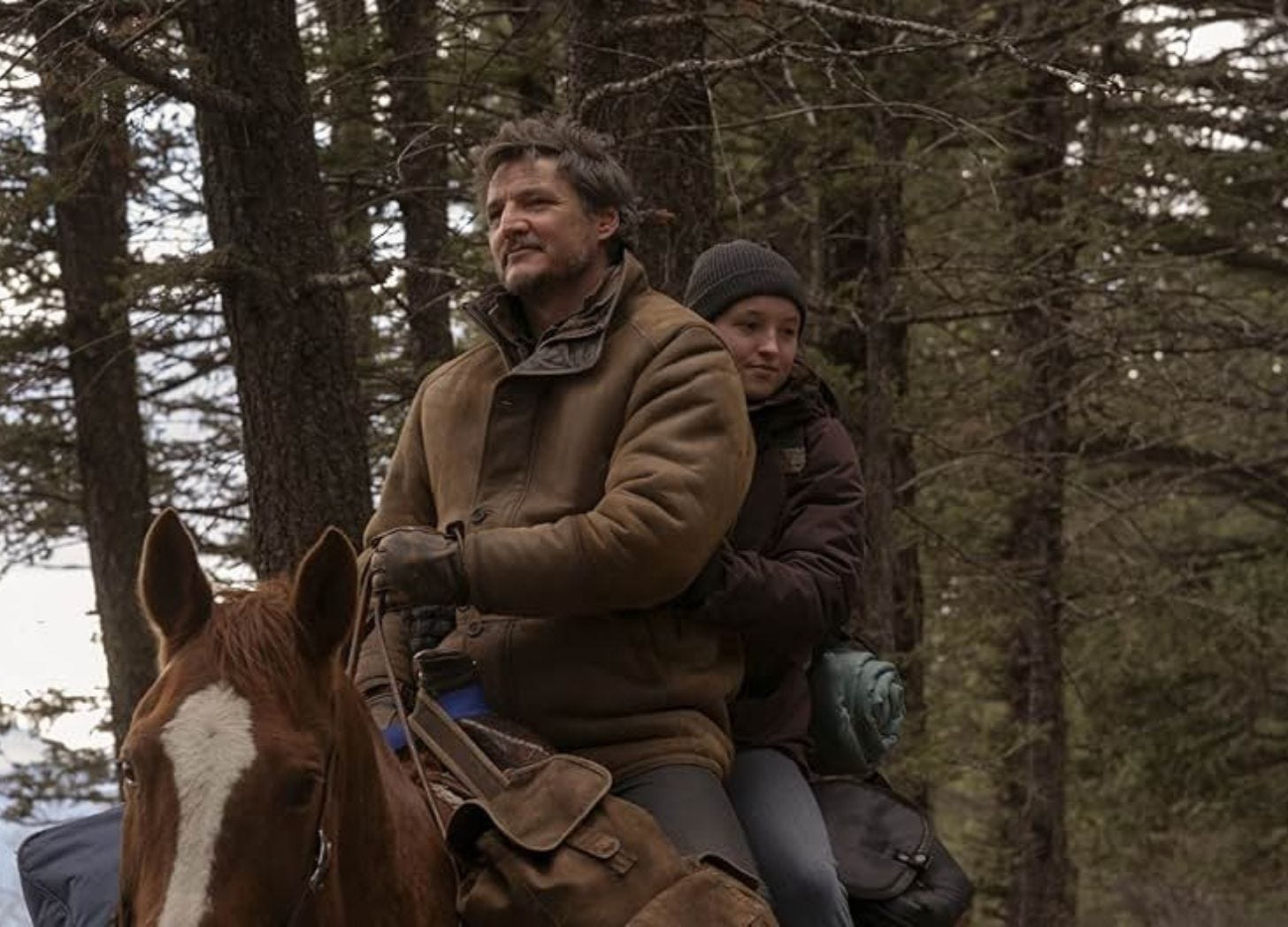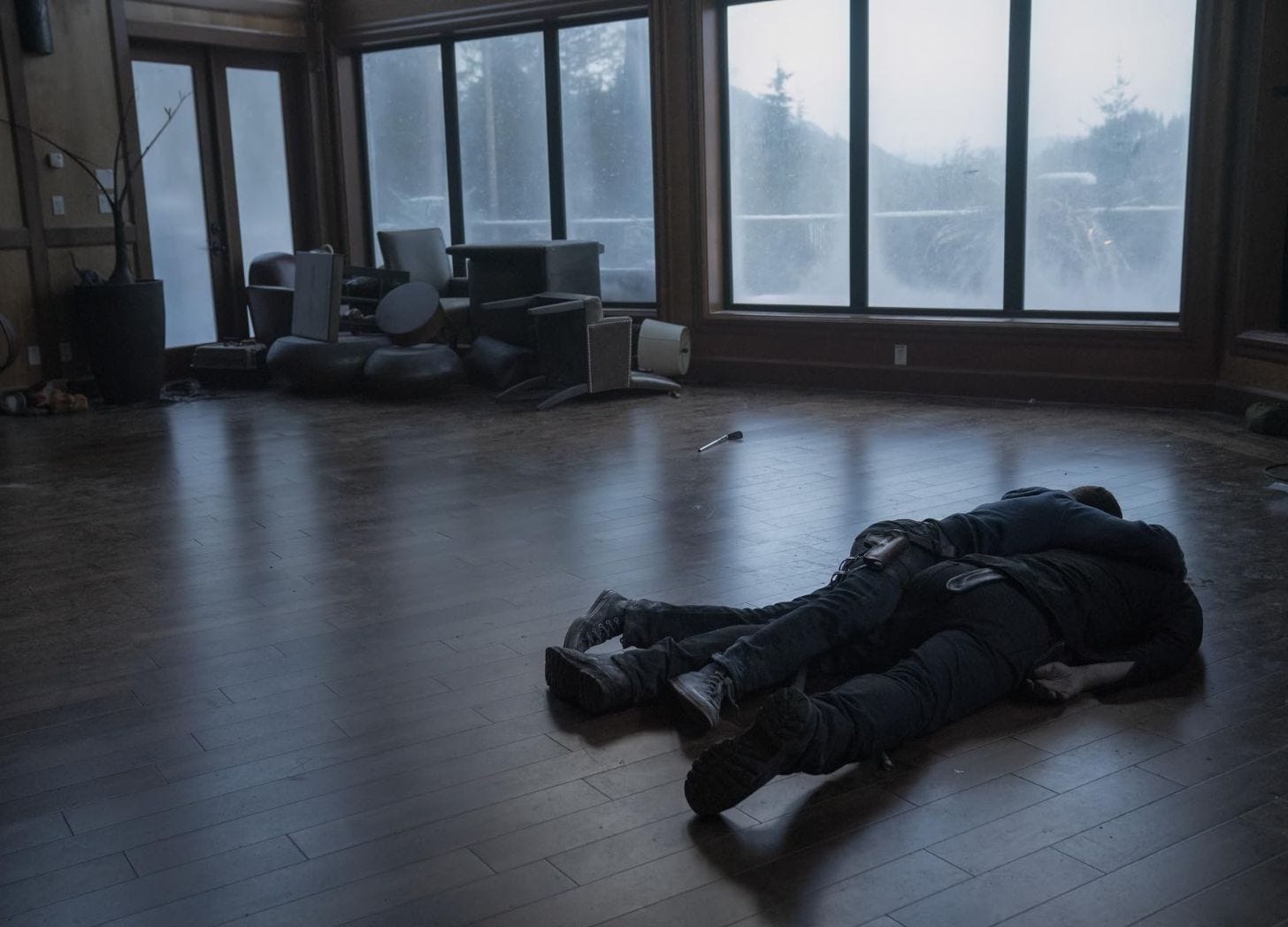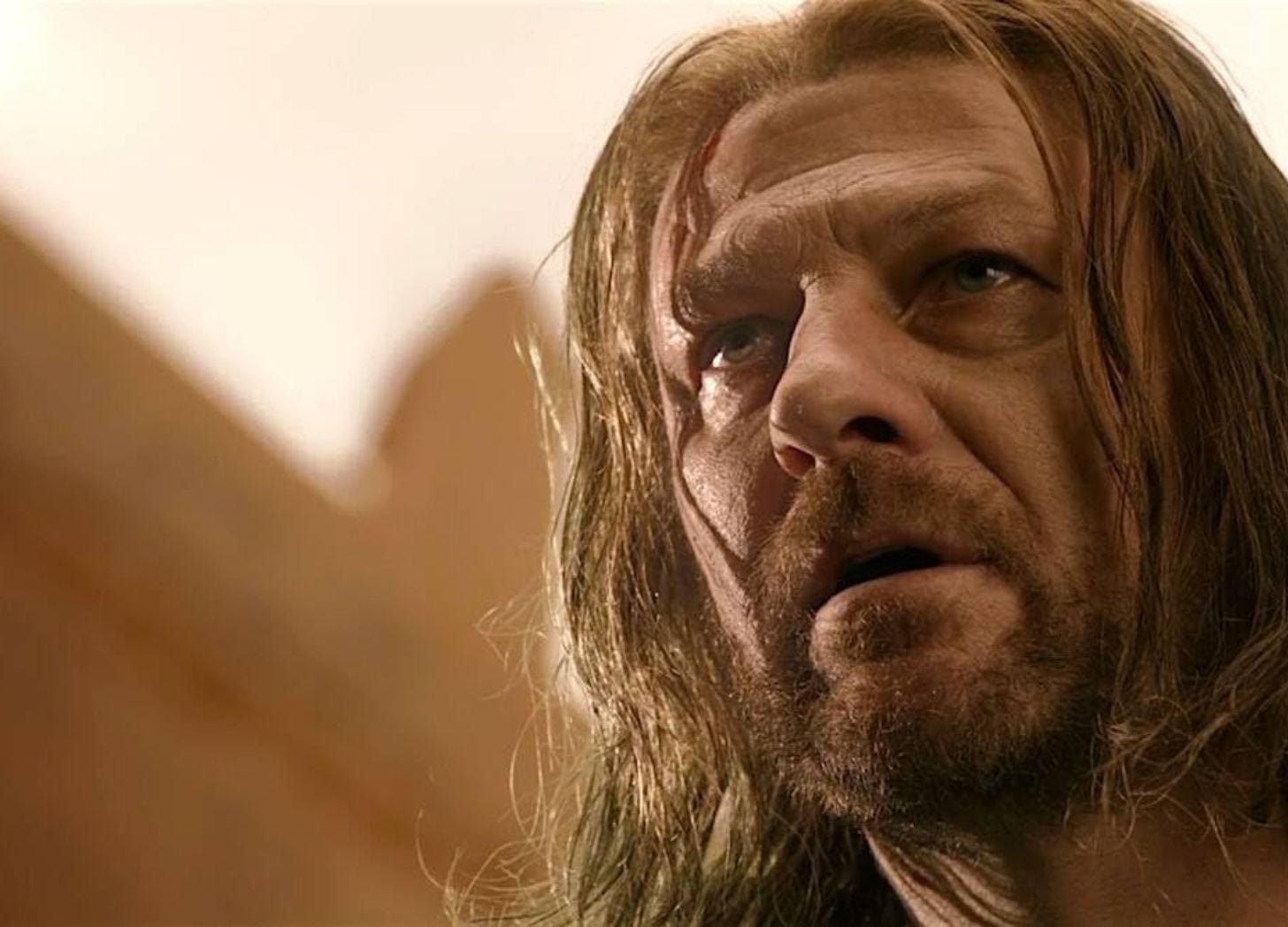If you’re new here, read this quick primer on the Story Energies, a new way to talk about storytelling.
A plan is a story. A destination is imagined, somewhere in our future, with a list of steps to take us there. Resources are allocated, obstacles anticipated, wheels set in motion. And then we follow one step and then another until we get to the climax, and dinner is dished out on warmed plates, or vengeance is served cold.
And isn’t there something rewarding about a good plan well executed, over and above the reward itself? Something satisfying, when things fall into place, and when ingenuity and hard work pay off? When the meal’s warmth, or the foe’s agony, feels earned?
Because this post is about planning and surprise in stories, it’s particularly rich with spoilers. If you’ve been looking forward to but haven’t yet watched up through Episode 2 of Season 2 of The Last of Us, you might want to go and do so now. I’m also going to talk about some shocking turning points in Game of Thrones. You can watch both these shows on Max.
In Season 1 of The Last of Us, Ellie (Bella Ramsey) and Joel (Pedro Pascal) make their way from Boston to Utah through the post apocalypse—Ellie seems immune to the fungal infection that is zombifying everyone else who is bitten, and Joel (who wasn’t able to save his own daughter) wants to see her safely to the Fireflies’ hospital where they will study her immunity in the hope of saving humanity. They go through a lot together on their journey, and become close.
But when they finally get to the hospital, Joel learns that their planned procedure will kill Ellie, so he goes on a rampage, shooting dead a couple dozen former allies (some after they’ve surrendered), and the surgeon, so he can carry her unconscious body to safety.
Season 2 opens with Abby—that surgeon’s daughter—vowing to kill Joel slowly. Five years later, in Episode 2, she and her reluctant crew arrive outside the town in Wyoming where Joel now lives with Ellie. It’s pretty fortified, and a vicious blizzard is moving in, so they hole up in an abandoned lodge to reassess. Ellie is duped into taking watch while her crew discuss how to make her abandon her unfeasible plan. She accidentally sets off a mini-avalanche, which in turn seems to accidentally wake up a horde of dormant ‘infected’, around the same time as fungal tendrils are found in old pipes running through the town. So the horde is summoned to the town, there’s an epic battle, and lots of Joel and Ellie’s friends are killed.
Joel and Ellie themselves, however, happen to be out on separate patrols—Joel happens to be with Ellie’s new love interest Dina, and they happen to come upon, and rescue, Abby from the snow/zombie horde. Abby convinces Joel and Dina to return with her to her lodge—her friends can help fight the horde—but her crew knocks Dina out, and Abby gets to fulfil her plan and beat Joel to a slow, brutal death.
Unlike all the times Joel almost dies in Season 1, there is no miraculous intervention to save him. Ellie does arrive at the lodge, but Abby’s friends quickly subdue her, and she can only watch through a blur of blood and tears as Abby delivers her fatal blow.
I think the reaction the show was looking for was: OHMYGOODGRIEFHE’SDEADPOORJOELPOORELLIEWTFISHAPPENING!!?!?!?!
My actual reaction was more like: Huh.
This willingness to kill off such a major character has drawn comparisons with Game of Thrones’ execution of Ned Stark towards the end of that show’s first season. This comparison, indeed, feels like one the creators of The Last of Us are cultivating—see, for example, the too-fast rushing of hordes of resurrected dead, and Joel’s brother Tommy’s Jon-Snow-like leadership atop the ‘wall’ of the fortified town as it was stormed.
But while this episode, and the show generally, are impressive in lots of ways—the acting’s great, the characters are complex and funny, the set-pieces are thrilling—Joel’s death had nowhere near the impact of Ned’s. Abby’s revenge, I am sorry (/not sorry) to say, left me cold, and not in an awesome, blood-curdled way.
What went wrong?
It’s about fourteen years, now, since I first watched the seventh episode of Game of Thrones, and that scene in the Castle gardens where Ned Stark—the King’s Hand—confronts Cersei Lannister—the King’s wife—about her ongoing plot to usurp the throne. But I still remember that evening pretty clearly, that moment when I realised there was something different about this new show I was binging.
He tells her to flee, to get as far as she can from Robert’s wrath.
And what of my wrath, Lord Stark, she says.
When you play the game of thrones, she says, you win or you die, there is no middle ground.
By the end of the episode, Robert has died, and Ned, having been outplayed in his power struggle with the Lannisters, has a knife to his throat. Cersei’s son Joffrey will be king, and Ned will be tried for treason.
In episodes 8 and 9, then, one thing leads to another until Ned is led out for his execution. Joffrey has agreed to show mercy if Ned will confess to treason and accept him as the rightful king, and for the sake of his daughter Sansa—betrothed, as she is, to this sadist child—he does confess, and declares Joffrey the rightful, one true heir to the Iron Throne.
The gods, it is declared, are merciful, and even Cersei has suggested Ned be spared and sent to the Wall with the Night’s Watch. But what say the sadist child Joffrey, who has now been placed in charge?
Bring me his head.
Oh no. There is still time for a daring rescue, but none materialises. All his two daughters can do is not look. The executioner strides forward, the chaos quiets, the screen goes black, and all that’s left is that sound of a sword slicing through a neck.
This scene, and its whole set-up, is buzzing with Story Energy.
There’s Potential Energy in (amongst other things) all the differences between Ned and Cersei that are made clear to us in that scene in the garden—leaving aside the fact that he is a man and she a woman1, he is honest, she is deceitful; he is loyal, she is treacherous; he is guileless, she is cunning.
There’s Gravitational Energy in this magical fantasy world that, unlike, say, Lord of the Rings, has a grim, gritty, realistic portrayal of politics. It is indeed as ruthless as Cersei suggests in that garden.
There’s Magnetic Energy in all the complicated relationships between the complex characters—including an intense enmity fuelled by Ned’s belief that Cersei pushed his son Bran out the window of a tower in Episode 1.
Electrical Energy fizzing in the crowd gathered for this public execution, and in the emotions felt by those present—by Ned’s two daughters, especially, along with Ned’s own awakening despair.
Kinetic Energy in the staging—most of the key players are literally on a stage, while Arya watches from the bustling crowd.
Elastic Energy in the rising tension—they won’t actually behead him, will they? Will they?
All this combines to generate serious heat, or Thermal Energy. It generated in me both shock and awe. I’ll probably never forget it.
Cersei, cold and calculating as she is, did not in fact push Bran out that window, her lover/brother Jamie did. And she did not, in the end, want to execute Ned, Joffrey did.
And a cruel twist for Ned is that Cersei’s defining value—the thing she cares most about—is one he shares. She gains strength from her family. This is true of a lot of people, but she goes further than most of us. She needs to control the throne so that the other Houses don’t persecute her family. She adores her twin brother Jamie so much she’s had three children with him while married to the King. She adores her son Joffrey so much she wants him to fulfil his dreams of tyrannical rule, even when she knows he’s a violent sadist.
All this considered, it’s clear that the show’s creators are more violent and cruel to Ned Stark than Cersei is. They are the ones with the truly malevolent plan. And they execute it with great skill and precision.
Joel’s execution is not devoid of Story Energy. In that first season, he was one of the most Magnetic characters on TV, as was Ellie, and their bond became supercharged. Many of us viewers will have bonded intensely with both of them.
The hordes of once-dead buried under the snow bring obvious Potential. And there’s Gravitational Energy in the post-apocalyptic jockeying for safety and resources between the factions of survivors.
And Joel did kill Abby’s surgeon father, in morally questionable circumstances, at best. Her thirst for revenge is understandable, and another powerful source of Potential Energy. And we can understand Joel’s Magnetic draw for her, because she wants to hurt him.
But, at least by this point in the story, we haven’t had a chance to get to know Abby. And she hasn’t had a chance to get to know Joel. Our understanding of her, and hers of him, are uncomplicated. And so not particularly interesting.
And instead of a careful arrangement of forces that interact with one another in ways that, at least in retrospect, feel natural to the point of being inevitable, Joel arrives at his execution thanks to a succession of coincidences and unlikely events, each of which, for me anyway, drains all sorts of Energy from the story.
Abby’s plan, as is obvious to even her own crew, is not clever or detailed or even plausible.
And the show’s creators’ plan wasn’t much better. So they set off an avalanche, roused a sudden horde of infected, and sent Joel out on patrol—they steered him right into Abby’s grateful hands. And I got none of that satisfaction from things falling smoothly into place. Instead I felt cheated.
Life, generally speaking, is chaotic. And a big part of why we tell stories is to try to make sense of the random and the arbitrary, so that we can feel in control.
So it can help, then, when the stories we tell are plausible—when the links between cause and effect are evident, and when they don’t rely too much on coincidence and dumb luck.
We don’t always need to be militant about plausibility—the suspension of disbelief is famously central to the whole project, and many of our most famous stories are founded upon wildly unlikely plot twists, and hails of bullets that all miss. And, as I just mentioned, life is in fact often random and arbitrary, so in a way a story where everything falls perfectly into place is the biggest lie of all.
But it is nice—it is grounding, and absorbing, and satisfying—when we can believe the story we are being told. That golden age of HBO drama, that began just before The Sopranos and ran through The Wire all the way up until about season five of Game of Thrones, was built upon shows that took themselves seriously, and treated us viewers with respect. They worked hard to make us believe in them, and to make their stories feel true to life, even if they had dragons and rampaging hordes of dead people.
I know that this is an obvious point to make—that this moment in this show wasn’t very good because it was contrived. And there’s maybe an obvious counterargument: relax, enjoy it, stop being a dick. But if one of HBO’s biggest shows makes only this much effort to make one of its defining moments into something that we, as viewers, can really believe in, doesn’t that feel like a damning indictment of the state of storytelling in 2025? Can we not do better than this?
What about you? Were you let down by Joel’s execution? Or were you blown away?
Do you think it’s dangerous to put a sadist child in charge?
Let me know in the comments!
You can watch Game of Thrones and The Last of Us on Max.
Several dissertations have probably been written on gender dynamics in the series.















The biggest difference here is George RR Martin’s source material. Any show based on books will likely have a much better plot and character development than anything strictly made for TV (with the exception of Wheel of Time, but that’s a whole different can of worms). This is showcased best in GoT itself. Season 7&8 didn’t have any pre-existing story to anchor the plot and it went off the rails in a spectacular way. Joel’s death in LoU felt more like Littlefinger’s death in GoT. It was needed for the show, so they dealt with it in an easy way to help get the other characters moving.